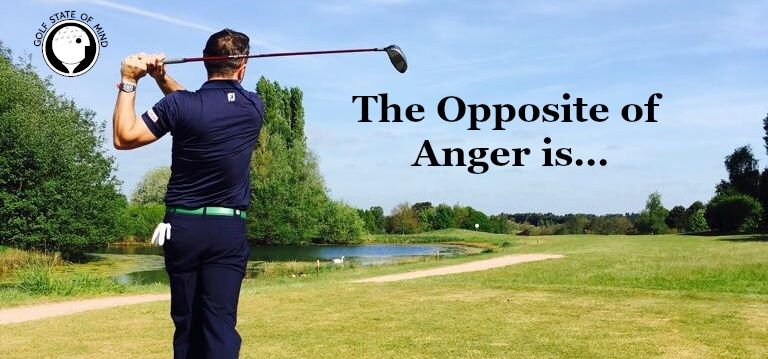
The Opposite of Anger: Gratitude in Golf
- March 31, 2024
- David MacKenzie
- Emotional and Thought Control
- 0 Comments
In episode 3 of Season 2 of the “Full Swing” on Netflix, Wyndham Clark talked about some of his strategies for managing emotions during the 2023 US Open (that he won).
He spoke of creating an internal state which is “the opposite of anger”, which clearly helped him deal with the moments in the round where he would have felt that emotion (there is a lot at the US Open). In this week’s lesson, we’ll explore some ways that you can do it too.
The unpredictable tapestry of emotions that we get to experience in a round of golf is one of the reasons the game has such appeal. We simply don’t know what we’re going to get and how we will feel.
- We can experience the thrill and excitement of hitting a great drive, or seeing a 20-footer go in.
- We can experience the satisfaction of a good score or a sense of pride and achievement from winning.
- We can experience the sinking disappointment of seeing a short putt lip out.
- We can experience the frustration and anger of hitting a ball out of bounds and adding 2 shots to our score when we are in a good position.
Tennis legend, Novak Djokovic says:
“The biggest battle is always within. You can’t be positive all the time. You are a human being [you will feel negative emotion and doubts]. The biggest difference between champions and the ones who struggle to get to the highest level, is the ability to not stay in those emotions for too long.”
Work on your “Human Skills”
We are human beings before we are golfers, and the fact is, we will experience negative emotions and negative thoughts at times, so we need to have a plan to get better at dealing with them.
Whatever the emotion that arises at the time (positive, negative or neutral), we cannot decide. But we can influence the depth of that emotion and how skillfully we can move on from it into a more desirable state. This is a big factor in how successful we become in competitive golf. Negative emotions can trigger a negative narrative, and that story can change how we feel and take us further away from the present moment making it harder to play the next shot as best we can.
Conquer The “Big Moments”
In the so-called “bigger moments”, emotions are amplified. A missed short putt in the latter stages of the round will hurt more than at the beginning. For a player like Wyndham Clark playing in the US Open (and being in contention), emotions, both positive and negative will be high. You can expect them when you are nearing a big achievement or next level in your golf career. In the past, Wyndham didn’t deal with them well and started to beat himself up and make it worse. He got stuck in that emotion, making it hard to return to a performance state to give the next shot his best. But with work in this area (with a mental coach for golf), he learned how to create an internal state which is more resistant to high negative emotion, so while others were losing their heads, he was able to rise above and win his first major.
Emotional control is something that we need to train and practice, so we can deal with the big moments that are critical to our success.
“Positive” emotions, such as joy, happiness and excitement are great to feel (and are less of a concern in terms of emotional management), but they too can trigger thoughts that take us from the present (it’s not just negative ones that can do this). E.g. The excitement from making a birdie in the closing stages of a tournament can trigger thoughts of winning the tournament, when there is still work to do.
Gratitude: The Opposite of Anger
“Gratitude is the antidote to the two things that stop us: fear and anger. You can’t be grateful and angry simultaneously. You can’t be fearful and be grateful simultaneously.” – Tony Robbins
When Wyndham Clark was talking about “the opposite of anger”, he was talking about gratitude. If you are able to play Grateful Golf, you’ll be less affected by negative emotions. This doesn’t mean that you are any less competitive a player (a common misconception of being a grateful golfer), rather you’ll be a less emotional golfer, which will allow you to be more competitive.
As Martin Seligman, the “father of positive psychology” tells us, both gratitude and optimism are trainable. If you can avail yourself of gratitude daily and throughout your rounds, you’ll be less affected by negative emotions over time. When we express gratitude, the brain releases dopamine and serotonin, two neurotransmitters, which enhances our mood immediately.
Ask yourself at the beginning and end of every day, what can you be grateful for about your life (and the game of golf)? Here are some suggestions:
- Your family and friends
- Your health and the opportunity to play
- The beauty of the course and your surroundings (during your round)
- You get to play another shot (during your round)
I’m sure you’ll have many more things to add. Be mindful of your gratitude list throughout the round. like Wyndham intended before the US Open. You can also add it to your mental scorecard for an additional reminder (if you don’t already have the template you can download it below).
David MacKenzie


Lucky Golf Secret: You Can Learn How to Be Lucky in Golf
I hear many golfers talking about opponents or playing partners being "luckier" than they are.…

Controlling Emotions in Golf
Controlling Emotions in Golf with Self Awareness or “Mindfulness” "Being your best means creating a…

